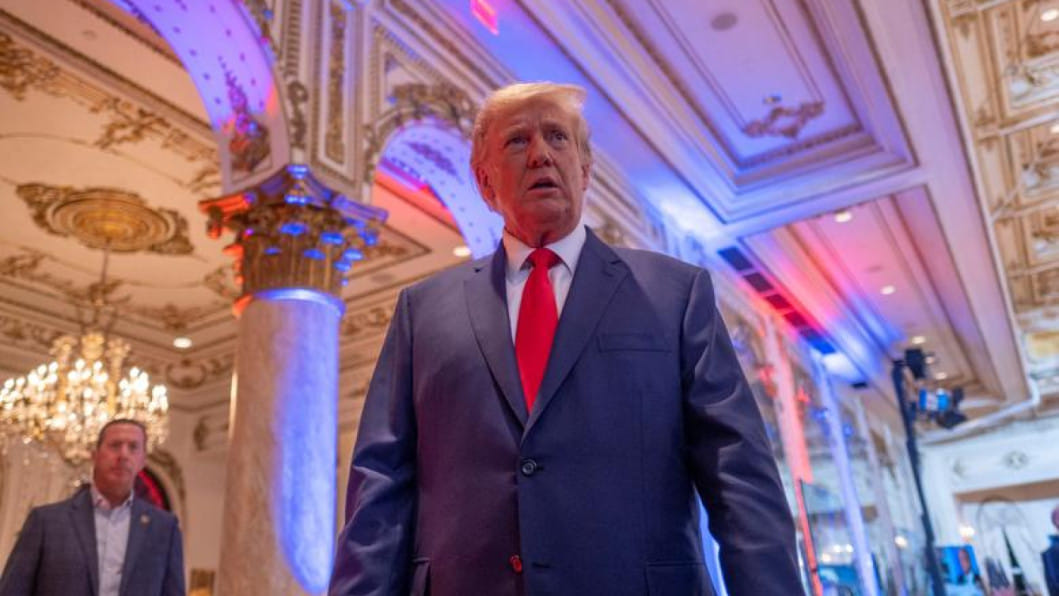The fall of 'Trumpty Dumpty' has begun after the US midterm elections

The much-anticipated Republican red wave did not happen in the 2022 US midterm elections. The blame game has already started, exposing a fault line in the Republican Party that splits around the looming question of Donald Trump and his ultra-nationalist MAGA movement's future in the US body politic.
Over the last four decades, the political party of a first-term president has tended to suffer a shellacking during midterm elections.
In 1982, Ronald Reagan – who had an approval rating of 42 percent – lost 26 seats in the House of Representatives. Bill Clinton lost 52 with 48 percent in 1994, and Barack Obama lost 63 with 45 percent in 2010. All three were re-elected for a second term.
In 2020, Trump lost 40 House seats with an approval rating hovering at about 44 percent and was unable to get re-elected.
During this year's midterms, President Biden faced enormous challenges – including inflation fueled by lingering effects of the pandemic, supply chain disruptions, and Russia's aggression against Ukraine. The exact causes are debated. Stimulus payments given to needy citizens by the Biden Administration may have played a role – although, without that stimulus, more deaths and suffering would have descended. And when inflation first emerged late last year, the US Federal Reserve – an independent agency theoretically not beholden to the president – could have tightened monetary policy, perhaps preventing inflation from reaching its current heights.
In the end, it doesn't matter who or what is to blame – all the responsibility is usually thrown at the sitting president.
Yet, somehow, Biden dodged the four-decade trend of losing a significant number of congressional seats during the midterms, despite severe inflation and a dismal approval rating hovering near 44 percent. How did he do it?
The anti-abortion Dobbs ruling of the US Supreme Court, which has a conservative supermajority appointed by Republicans, unleashed a seismic backlash regarding women's healthcare. The terrible rush to introduce cruel anti-abortion laws in state legislatures dominated by Republican supermajorities alienated suburban women voters and independent swing voters. Additionally, many ultra-rightwing MAGA candidates were conspiracy theorists and 2020 election deniers. They were endorsed and promoted by Donald Trump, but rejected by moderate voters.
These factors stifled the anticipated red tsunami. President Biden's Democratic Party maintained its majority in the Senate. And when vote-counting for the House is done, Democrats may lose the House, but with a single digit margin.
A stunned Republican Party, its talking heads, and its pollsters now scramble to find someone to blame for their dismal showing. Where the blame ultimately lands will likely be announced by the mouthpieces of the Republican Party, such as the newspapers and networks owned by Rupert Murdoch's News Corp – FOX News, The Wall Street Journal, the New York Post, etc – which played an important role in Donald Trump's political ascendency. Some of these media outlets acted as propaganda vanguards for Trump, spreading conspiracy theories like the Great Replacement theory, which is an absurd, racist, ultra-rightwing conspiracy saying that non-white minorities, aided by elite progressives, are taking control of the US by replacing the white majority. Theories like this have generated anger and discontent in wings of the Republican Party, and sparked violence – even mass murder.
The day after the midterm elections, Murdoch's media empire turned against its Messiah, Donald Trump. The Wall Street Journal published a joint editorial that said, "Trump Is the Republican Party's Biggest Loser." The popular tabloid, the New York Post, placed a clownish caricature of Donald Trump on its front page, headlined with "Trumpty Dumpty," alongside a child's limerick.
So, what happened? What changed the minds of the principal mouthpieces of the Republican Party?
To answer these questions, let us look at the past. After the failed insurrection of January 6 at Capitol Hill, a fault line originally formed prior to the 2020 Presidential election by a handful of anti-Trump Republicans (dubbed Never Trumpers) cracked wider in the Republican Party, between traditional Republican conservatives and populist MAGA partisans. Trump maintained a firm grip on the MAGA partisans – who comprise many ultra-nationalist white supremacists and ultra-conservative evangelical Christians to whom Donald Trump is the Messiah – the second coming of Jesus Christ, the Son of God.
American elections generally have two phases, a primary election followed by a general election, in each state. In primary elections, voters choose which candidates from political parties will represent the party in the general election in each state. In primary elections, these choices are usually – but not always – decided by a small population of registered and devoted Democratic and Republican voters. A large portion of such primary voters come from the more extreme wings of each party.
Donald Trump still has a strong grip on portions of the Republican Party that tend to vote in primary elections. Therefore, in this cycle, for winning Republican primaries, Trump's endorsement was the name of the game.
To curry Trump's favour, we saw fierce competition among candidates trying to show they could be the perfect parrot echoing the personal grievances of Trump, the best election denier, and the most ardent devotee of conspiracy theories. Many of these Trump acolytes won the primaries. But they could not win in the general election because independent voters (approximately 31 percent) and moderate Republican voters were repulsed by their extreme, ultra-rightwing positions. This set the stage to stifle the anticipated red tsunami that seemed bound to happen in a political landscape ripened by voter discontent due to pocketbook pain and rampant inflation.
The 2022 US midterm elections revealed that independent voters and moderate Republican voters were unwilling to buy the narrative of Trump's extreme MAGA movement and his election denial.
Donald Trump, the "Trumpty Dumpty," has fallen from the graces of the Republican kingmaker, Rupert Murdoch.
Ron DeSantis, the governor of Florida, who was just reelected for his second term by a margin of 20 points, is now outperforming Trump as a Republican hero. Many Republican mega-donors and operatives appear to be distancing themselves from Trump. A recent YouGov poll shows that Trump scored only a 35 percent approval compared to that of DeSantis' 47 percent. Trump's fall has begun.
Dr Mostofa Sarwar is professor emeritus at the University of New Orleans, former dean and vice chancellor of Delgado Community College, and former commissioner of the Board of Trustees of the Regional Transit Authority of New Orleans. Email: [email protected]

 For all latest news, follow The Daily Star's Google News channel.
For all latest news, follow The Daily Star's Google News channel. 













Comments